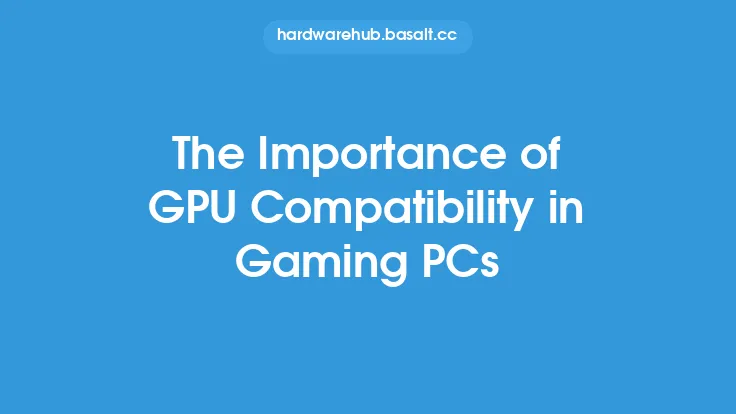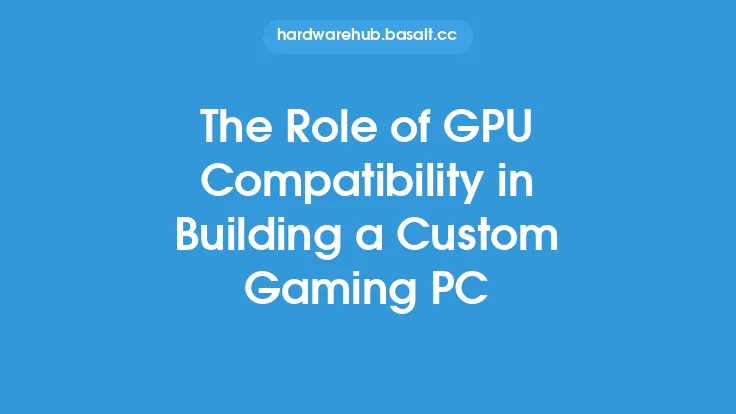When it comes to gaming, having a powerful graphics processing unit (GPU) is crucial for a seamless and enjoyable experience. However, with the numerous options available in the market, it can be challenging to determine which GPU is the best fit for your gaming needs. This is where GPU benchmarking comes in – a process that helps evaluate the performance of a GPU in various gaming scenarios. In this article, we will delve into the importance of GPU benchmarking in gaming and explore how it can help you make informed decisions when it comes to upgrading or purchasing a new GPU.
What is GPU Benchmarking?
GPU benchmarking is a systematic process of evaluating the performance of a GPU by running a series of tests that simulate real-world gaming scenarios. These tests, also known as benchmarks, are designed to push the GPU to its limits, measuring its ability to handle demanding graphics, high frame rates, and complex computations. The results of these benchmarks provide a comprehensive overview of the GPU's performance, allowing gamers to compare different models and make informed decisions.
Why is GPU Benchmarking Important in Gaming?
GPU benchmarking is essential in gaming for several reasons. Firstly, it helps gamers determine whether a particular GPU can handle the demands of their favorite games. By running benchmarks, gamers can identify potential bottlenecks and ensure that their GPU can deliver smooth frame rates, high graphics quality, and low latency. Secondly, GPU benchmarking enables gamers to compare the performance of different GPUs, making it easier to choose the best option for their budget and gaming needs. Finally, GPU benchmarking helps gamers identify areas where their GPU may be struggling, allowing them to optimize their system for better performance.
Types of GPU Benchmarks
There are several types of GPU benchmarks, each designed to test specific aspects of a GPU's performance. Some of the most common types of benchmarks include:
- Synthetic benchmarks: These benchmarks use artificial scenarios to test a GPU's performance, such as 3DMark, Unigine Heaven, and Valley.
- Game benchmarks: These benchmarks use real games to test a GPU's performance, such as Assassin's Creed, The Witcher, and Fortnite.
- Stress benchmarks: These benchmarks push a GPU to its limits, testing its ability to handle extreme temperatures, power consumption, and performance demands.
- Graphics benchmarks: These benchmarks test a GPU's ability to handle graphics-intensive tasks, such as rendering, shading, and texture mapping.
How to Interpret GPU Benchmark Results
Interpreting GPU benchmark results can be complex, but there are several key metrics to look out for. These include:
- Frame rates: This measures the number of frames per second (FPS) that a GPU can render, with higher frame rates indicating better performance.
- Graphics quality: This measures the level of detail and realism that a GPU can render, with higher graphics quality indicating better performance.
- Power consumption: This measures the amount of power that a GPU consumes, with lower power consumption indicating better efficiency.
- Temperature: This measures the temperature of a GPU during benchmarking, with lower temperatures indicating better cooling performance.
The Impact of GPU Benchmarking on Gaming Performance
GPU benchmarking has a significant impact on gaming performance, as it helps gamers identify areas where their GPU may be struggling. By optimizing their system for better performance, gamers can enjoy smoother frame rates, higher graphics quality, and lower latency. Additionally, GPU benchmarking helps gamers choose the best GPU for their budget and gaming needs, ensuring that they get the most out of their system.
The Future of GPU Benchmarking
The future of GPU benchmarking is exciting, with new technologies and innovations emerging all the time. One of the most significant developments is the rise of artificial intelligence (AI) and machine learning (ML) in GPU benchmarking. These technologies enable more accurate and realistic benchmarks, allowing gamers to get a better understanding of their GPU's performance. Additionally, the growth of cloud gaming and game streaming services is driving the development of new benchmarking tools and technologies, designed to test the performance of GPUs in these emerging markets.
Conclusion
In conclusion, GPU benchmarking is a crucial aspect of gaming, enabling gamers to evaluate the performance of their GPU and make informed decisions when it comes to upgrading or purchasing a new GPU. By understanding the importance of GPU benchmarking and how to interpret benchmark results, gamers can optimize their system for better performance, choose the best GPU for their budget and gaming needs, and enjoy a seamless and enjoyable gaming experience. As the gaming industry continues to evolve, the role of GPU benchmarking will only become more important, driving innovation and advancements in GPU technology.





